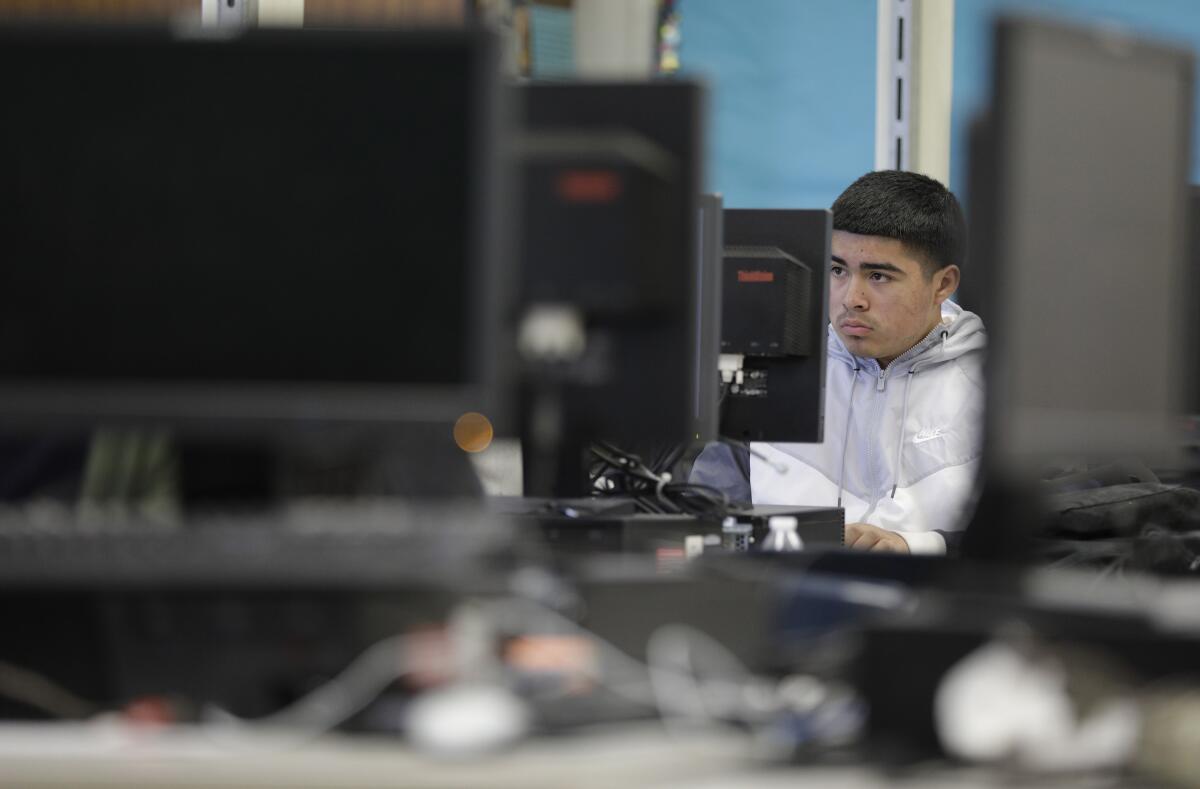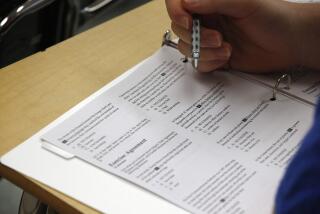Will California students have to take standardized tests at home? Educators are wary

- Share via
California’s top education officials are struggling with how — or even if — millions of students should take annual standardized tests at home amid ongoing school closures and the hardships of surging COVID-19 rates.
Although members of the state Board of Education voted to move forward this week with complex standardized testing plans, a majority of members said at their Wednesday meeting that they support seeking a federal waiver to skip testing for a second consecutive year because of the many complications, stresses on children and families, security challenges and even the inability of many students to take the test online at home.
“I don’t want to overstate this — but I sort of feel this way — that it would be education malpractice to require [local school agencies] to provide results of assessments that really are seriously in jeopardy of being valid as we go forward,” said board member Sue Burr, who favors focusing on easing the test burden during the pandemic.
Yet the state’s top education leaders also agree that gathering test data is critical to accurately measuring the extent of learning loss among students during pandemic-forced distance learning, which has disproportionately failed low-income Black and Latino students, those with special needs and students in rural districts.
It is unclear how President-elect Joe Biden’s pick for secretary of Education, Miguel Cardona, will deal with the issue. Federal law requires states to administer annual standardized testing in reading and math.
While the U.S. Department of Education under former Secretary Betsy DeVos waived testing requirements for all states last year, it did not say it would do so again. DeVos resigned from the Trump administration after the Jan. 6 attack on the Capitol with the issue still unresolved.
While awaiting clarity, the state board had little choice but to consider how to support and prepare school districts for remote testing.
There is a possibility that the Biden administration will present states options for flexibility in administering testing, including the possibility of waivers, state Supt. of Public Instruction Tony Thurmond said in an interview with The Times.
Many educators expressed deep concerns with remote testing.
Lorraine Richards, a member of the California Teachers Assn., told the board that nearly 15,000 educators signed a petition in favor of a federal waiver.
“The devastating impact of the pandemic continues to ravage so many communities across our state, especially our low-income communities, and there is no way to safely administer the assessments,” Richards said. “Our state’s focus must be on supporting our most vulnerable students, and not forcing assessments that will be a logistical nightmare and provide data that is not valid, nor reliable.”
Thurmond, in the interview, also expressed doubts about administering tests at home.
“Right now, when kids can’t be safely in classrooms … it doesn’t seem to me that there is a way to really do testing and get meaningful results from it,” Thurmond said. “We’re in survival mode.”
Linda Darling-Hammond, president of the board and the leader of Biden’s education transition team, did not indicate what the state can anticipate from the president-elect.
“We need to wait for the new administration to arrive,” Darling-Hammond said. “So we will have to hear from people, take stock and then perhaps even at some point shortly, we reconvene if there are any changes to our current course of action.”
Mao Vang, who directs state testing, updated the board on how the rollout of the optional statewide English-proficiency tests went in the fall for about 40,700 students, indicating some of the problems that could lie ahead with broader testing. The state guidelines allowed school districts to conduct in-person testing where local health guidelines allowed, or conduct tests remotely online or by paper.
Remote tests were delayed because it was difficult to secure signatures from parents; there were not enough resources to install secure browsers on devices; proctors were reluctant to sign a security affidavit for fear of being held accountable for anything that went awry in the students’ homes, and students still struggled with bandwidth and internet access. Delivering booklets for written tests was difficult and expensive, Vang said, and some are still being received.
With all the unknowns and ongoing COVID-19 emergency, Vang acknowledged the state education department “may not be able to fully implement” standardized tests this year and any data collected would need to be used with caution.
The test, known as Smarter Balanced, is administered annually in the spring to students in grades 3-8 and 11, assessing them in reading and mathematics.
However, some worry that without testing, the state may not be able to collect insight on how students are progressing.
Board member Kim Pattillo Brownson said a survey of parents indicated most of them favored gathering data on student progress. Testing, she said, could give a clearer view into which students are experiencing the most learning loss.
“It is not uniform, and to know where it is most acute and be able to have the capacity to pinpoint that and address it in the future, I think, is a valuable tool that we should not give up on,” she said, adding that she was encouraged by conversations to extend the testing window beyond the spring semester.
A member of the California Parent Teachers Assn. spoke in favor of a plan to assess students for information, not accountability.
“We have a lot of potential to provide leaders, both locally and in the state, with some understanding of the impact this year has had on student learning, and what needs to be done to address that impact,” a representative from the organization told the board.
But many of the remote testing challenges may be insurmountable, especially in communities that have struggled with distance learning.
Board member Matt Navo said he thinks “there’s a lot of parents that won’t be willing to add the stress level to the remote learning that has already existed.”
The Central Valley Education Coalition, which represents school districts in six central counties, is concerned about the practical challenges facing rural school districts in administering tests online, especially as the Central Valley experiences a deadly increase in cases. In a letter to the board, the coalition cited concerns about access to online tests for the youngest students and those with disabilities.
“There’s very disparate access to internet connectivity in the Central Valley,” Andrea Ball, a representative of the coalition, told the board.
Ilene W. Straus, vice president of the board, pointed to the soaring case and death rates of COVID-19 in L.A. County as a reminder that in-person instruction is not a reality in the near future.
“I don’t think spring administration, with remote learning, is going to be an effective tool, other than in frustration,” Straus said.
Times staff writer Howard Blume contributed to this report.
More to Read
Sign up for Essential California
The most important California stories and recommendations in your inbox every morning.
You may occasionally receive promotional content from the Los Angeles Times.











